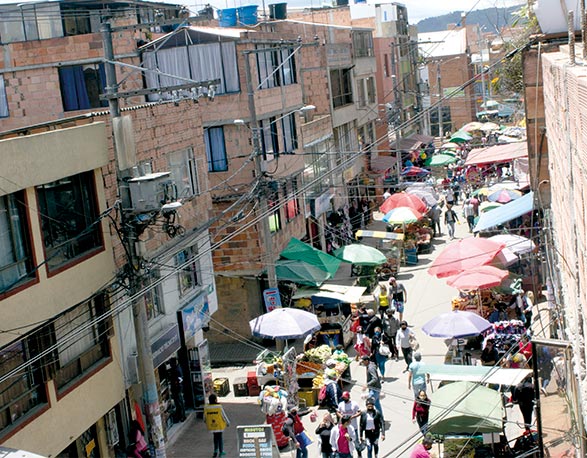Informal work and pandemic: from bad to worse
By: Ángela Constanza Jerez
Photos:
Economics and Politics

By: Ángela Constanza Jerez
Photos:
D espite the hard times she is undergoing, Patri - cia Lozada does not lose neither her smile nor the bright in her eyes; perhaps because, from the age of 10, when she arrived in Bogotá to work as a maid, she has been searching for a way to get ahead. A mission she thought she had completely accomplished be - cause she was in a better situation; however, the pan - demic showed her she was far away from her goal.
She and her husband do not have the car anymore, which they had bought, with much sacrifice, to do small freight jobs and carry products, early in the morning, at Corabastos’ market. None of the activities turned out to be profitable during the quarantines and lockdowns. Making handicraft and pre - paring empanadas (pies) to sell in the streets and her hus - band’s irregular jobs were not enough. Their incomes were not enough to pay the installment on the car, and they had to sell it. That is why she says, without any doubt, that the pandemic has left them nothing but headaches and debts. “One wants to do something, but the Government limits you a lot.”
Limited, oppressed and unprotected, that is how the informal workers in Colombia and other countries of the Global South have felt for years; workers who had an insecure situation before the pandemic, and it has become “ultrainsecure” with the current crisis. That means that if they did not have the money before to pay for the rent, purchase food and cover the costs of utilities (and some “luxury” like Patricia’s car), today they live in total insecurity and uncertainty. They are suffering from a disproportional impact due to the crisis that the country and the world are undergoing. The measures taken to combat COVID-19 have limited their productive activities and made it evident that they are covered by an inadequate security scheme and that the social policies for them are insufficient.
An international interdisciplinary group reached these conclusions after applying, since April 2020 quantitative and qualitative methods (data review and construction of life histories, among others) to determine what impact the pandemic has had on informal workers and their families. Their interest was to analyze this phenomenon from transnational, international law, and economic points of view, using Colombia as its main case study
“In the first days of the pandemic, The IEL Collective, a group of academics, activists, and public policy actors in the area of international economic law, from 12 universities around the world, started to think about how academic institutions and funders of research could respond to the crisis. We considered that one way to do it was to understand, from internation al law, the early social reactions and make an intervention in terms of public policies to deal with issues like social justice and the role of the law in the context of the pandemic,” explains Luis Eslava, professor of International Law and codirector of the Centre for Critical International Law (CeCIL) from the University of Kent, in the United Kingdom.

“The invitation this research makes is to enlarge coverage systems that are, hopefully, universal and unconditioned. That is simply honoring the promise of keeping the guarantees arising from social citizenship, enshrined in the Constitution. This is important, as the right to work has been reduced to a number of unfulfilled constitutional promises,” explains Iván Jaramillo, researcher of labour and professor.
In this way, the initiative Ruptures21: Towards new Economies, Societies and Legal Frameworks, was created, which looks to respond to the challenges posed by old and new economic, social and legal dynamics, just as to the impacts on the human and non-human world.
The first research work of Ruptures21, titled Informality in times of COVID-19, was an exercise conducted by socio-legal academics, labor economists, experts in public health, anthropologists, audiovisual artists, graphical, and digital designers, and officials responsible for public policies, who decided to explore an old-time phenomenon seriously affecting Latin America and that evidences an overlap between economy and law on a global scale.
The protagonist of this story, Patricia Lozada, was one of the workers who shared the testimony of her experiences with the researchers, who were supported by the University of Kent, the University of Essex and the University of Warwick in the United Kingdom, in association with many work units of the Universidad del Rosario: the Faculty of Law, the Labor Observatory (LaboUR), the Investigation Group in Public Health and the Alliance EFI (Formal and Inclusive Economy); the Observatory for the Equality of Women from the University of ICESI from Cali and the Collective ArtoArte.
Informality is the rule
The labor market conditions in Colombia were the leading reason for choosing it as the focus for analysis in this research. For example, the level of informality in the country is high (61.2% of the total number of workers) and before the pandemic, the high figures of unemployment were already evident, which surpassed the ones from neighboring countries: 12%, whereas the regional average is 7%. For that reason, the purpose the government set for the present four-year period has been to cut that figure to 7.8%, a goal that will be hard to meet under the current circumstances.
With that information provided by professors Johanna Cortés and Enrique Prieto from Universidad del Rosario, who belong to The IEL Collective, the researchers moved on to define what they understood by labor informality
That was the first debate we had as a research group. Informal workers are not a homogeneous group of vulnerable people, and even among them, there are some who enjoy better conditions than others do in formality. Thus, informality must not be taken necessarily as a problem or as an issue that must be addressed to correct,” recalls Iván Jaramillo, researcher at LaboUR and professor at the Faculty of Law of Universidad del Rosario

Luis Eslava, professor of International Law and codirector of the Centre of Critical International Law (CeCIL) at the University of Kent in the United Kingdom, states: “One of the calculations we did in our project led us to conclude that, if we take informal workers in Colombia, roughly 76.6% gets an income below ten dollars a day. Ten dollars are the basis used by international agencies like the World Bank to determine how much is necessary to lead a decent life in the XXI century.”
Colombia. As the researchers put it, the law deems it a problem, not as a working mode that must be recognized and regularized in pursuit of improving labor conditions and social protection. A most relevant matter, as the figures show that informality is the rule, not the exception, which means that labor security and the consequent recognition of labor rights are being progressively left aside
“We have a labor system characterized by the predominance of informality, not by formality. Having such a high figure of informality in Colombia means, firstly, that we have a high number of vulnerable homes at which public policies have to be aimed. It is in those homes where the help must be focused, especially in the context of a pandemic. And secondly, that we face a space of very high deregularization where the labor laws do not intervene, but where the market laws do, which damages the decent working conditions,” adds Jaramillo
That undermining of labor conditions is, at the end of the day, what has been evidenced by the in vestigation of Ruptures21 and that leads its authors to make a call for the design of new public policies. They point out that the deterioration occurs not only in Colombia and in the region but also across the whole planet. Besides, it has been happening for many decades and made worse by the fact that governments try to tackle it with measures related to a labor world that does not exist any longer Professor Eslava, general coordinator of Ruptures21 and of the research investigation Informality in times of COVID-19, explains it in this way
“The mechanisms that have been traditionally used to ensure labor conditions and social well-being in general have been disappearing in the whole planet.
What are these mechanisms? The capacity of countries to offer stable and long-term employment, so they assure the income and the consolidation of a middle class, has happened normally through the activities of the indus trial and manufacturing sectors. This possibility is becoming more and more remote due to the restructuration of the global economy according to the parameters associated with neoliberalism, the concentration of global industrial capacity in Asia and the offer of job positions, which is constantly decreasing because of the rapid process of automatization of productive processes. For these reasons, we must generate today new frameworks to understand and support these economic and well-being processes that go on in that big package that we identify as ‘the informal economy’.”
With these clarifications, the researchers agreed to conceive the informal workers as those who are not affiliated with the health and pension systems, and therefore lack stable social protection. These criteria, which involve the largest number of workers in Colombia, follow the principles of “Decent Work” of the International Labor Organization (ILT)
Consequently, assuming that a Colombian household has 3.2 people approximately, the informal economy provides a living for approximately 21 million people (43% of the population). This is a population with insecurities that may worsen as informality is related to the level of poverty (measured in terms of incomes) and that level is related to a lower capacity to respond to a crisis.
Multiple international organizations have confirmed that we have lost the last 10 years of progress in eliminating monetary poverty,” Eslava clears up. “This is quite severe, because even before the pandemic, in terms of income, we were in a hard situation. One of the calculations we did in our project led us to conclude that, if we take informal workers in Colombia, roughly 76.6% gets an income of less than ten dollars a day. Ten dollars is the basis used by international agencies like the World Bank to determine how much is necessary to lead a decent life in the XXI century. And if we look at the extreme level of poverty, which is 1.90 dollars a day, 16 % of informal workers earn less than that. Thus, we are dealing with quite a large sector of the population, most of whom are very poor or on their way to be extremely poor. This is one of the hardest challenges for Colombia today. A challenge shared by many countries in the same situation.”
Given the worrying horizon that results from the evidence, which is predicted to worsen with the increase of people in informal labor as they lose their jobs because of the situation derived from COVID-19, the researchers of Ruptures21 have proposed that the sanitary emergency be conceived as a syndemic instead of a pandemic
The concept is used to refer to a public health crisis in an interaction with extended social phenomena (economic, racial, gender, etc.), which makes the crisis deeper. “The insecurities evidenced by the pandemic, that have now grown into ultrainsecurities, force us to seek alternatives to public policies, built in spaces of social dialog regarding social and labor protection, as well as to plan the steps for economic reactivation in view of the deep inequalities existing in the country,” as put by the researchers in Report 3 of the project Informality in times of COVID-19. This is one of the three reports generated by the study, which contain suggestions for public policies in the areas of social security, economy, and social policies. The documents gather information backed by one of the most complete aggregated databases about the informal economy, collected by the research team, and houghts are complemented by five life histories that have been produced after the interviews conducted with informal work ers. The project has additionally produced a documentary, three video clips, and a series of activities for social intervention, includ ing an exercise of socialization that used stickers and boards showing key phrases resulting from the project. These materials, in Spanish and English, are available on the web site www.ruptures21.com
All these products of the research, on top of exploring the effects of the pandemic on informal workers, seek to newly describe the informal economy as a whole. In particular, they intend to offer a new view on informality in relationships with the transformation of work at a global scale,” summarizes Eslava, as coordinator of the project.
“The invitation this research makes adds professor Jaramillo broadens coverage systems, which are hopefully universal and unconditioned. That is simply honoring the promise of keeping the guarantees arising from social citizenship, enshrined in the Constitution. This is important, as the right to work has been reduced to a series of unfulfilled constitutional promises.”
In the reports of the project Informality in times of COVID-19, the researchers put forward recommendations in different lines. These are some of them:
